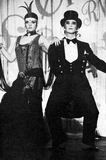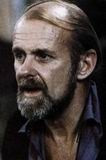
Special Events 2002 / Cabaret / USA 1972
At the time of its release, this famous film adaptation of the stage musical brought about a marked shift in the conception of the genre. The musical numbers take place only at the cabaret and in part narrate an ostensibly romantic tale of the relationship between an American cabaret singer and a cultured Englishman, which unfolds in 1930’s Berlin as the Nazis rise to power.

Though this film adaptation of the well-known musical is a classic of the genre, it transcends conventionally established limits. All the musical numbers are performed on stage at a cabaret and they serve as a commentary on the action, which unfolds as a realistic period piece. Cabaret differs from traditional lightweight musicals in its politicised content: the story takes place in 1930’s Berlin at a time when the Nazis are inconspicuously coming to power. The creators of the stage version rewrote some of the songs for the film and thus the screen version is generally considered more successful than the play. Undoubtedly, director Bob Fosse can take credit for this, as he managed to link the story’s various levels and to provide the film with his proverbial energy and ability to concisely express human emotion. The film is indebted for its great success (eight Oscars, among other awards) to Liza Minnelli in the leading role of American cabaret singer Sally Bowles. In 1931 this nonconformist young woman befriends Englishman Brian Roberts, and they and aristocratic lady killer Maximilian witness Hitler’s rise to power and the gradual transformation of the once cosmopolitan town. Soon enough, Brown Shirts, who have already taken over the streets also “conquer” the Kit Kat Klub, the cabaret of the film’s title, presided over by that now all-too-famous wisecracking master of ceremonies....
124 min / Black & white, 35 mm
Director Bob Fosse
/ Screenplay Jay Presson Allen podle knihy Goodbye to Berlin od Christopher Isherwood/based on a book Goodbye to Berlin by Christopher Isherwood
/ Dir. of Photography Geoffrey Unsworth
/ Music John Kander
/ Editor David Bretherton
/ Producer Cy Feuer, Harold Nebenzal
/ Production ABC Circle Films, American Broadcasting Company
/ Cast Liza Minnelli, Michael York, Helmut Griem, Joel Grey, Fritz Wepper, Marisa Berenson, Elisabeth Neumann-Viertal, Helen Vita, Sigrid von Richthofen

Bob Fosse (b. 1927, Chicago – d. 1987, Washington, D.C.) was fairly “born” on stage as he was the son of a vaudeville performer. He began his career as an actor and dancer, debuting on Broadway during the 1949-50 season. He then spent some time in Hollywood as an actor, dancer and choreographer. He returned to Broadway as a choreographer, and soon added directing musicals to his list of accomplishments. Thus, he rather logically debuted in film (as a director) with an adaptation of the musical Sweet Charity (1960). After twelve years, the groundbreaking Cabaret appeared and was recognized with eight Academy Awards. He garnered much attention for the cult film Lenny (1974) about popular comedian Lenny Bruce, with Dustin Hoffman in the main role. He attained the peak of his career with the autobiographical All That Jazz (1979). The director ended him film career with the unsuccessful Star 80 (1982), relating the tragic story of model and playboy bunny Dorothy Stratten. Bob Fosse was one of the most accomplished talents of stage and screen musicals, an innovator in this classic American genre.
First-hand brews throughout the year.
Be among the first to learn about upcoming events and other news. We only send the newsletter when we have something to say.